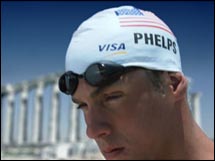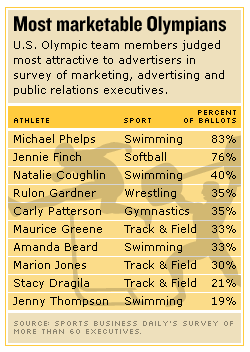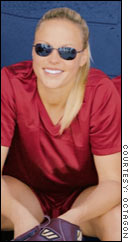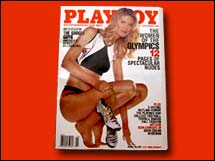
NEW YORK (CNN/Money) -
If projections are correct, dozens of U.S. athletes will win gold medals at the Olympics in Athens. But only a fraction of those winners are likely to strike advertising gold after the games.
 |
|
| U.S. swimmer Michael Phelps, shown here in a Visa ad, is one of the Olympians to already have scored advertising deals. |
Part of the problem for the winners is that most Olympic athletes are virtually unknown as the games begin. Even those who spend the next two weeks in the media spotlight will have little in the way of exposure for the next four years.
For all his magazine covers and advertisements so far, for example, U.S. swimmer Michael Phelps is probably less well-known now than the average star athlete from a major team sports.
And once Phelps climbs out of the pool for the last time in Athens, few will see him compete again until he dives into a pool in Beijing at the 2008 games.
But Phelps -- who some hope will be able to top the 32-year-old, seven gold medal mark of Mark Spitz -- has already been able to score advertising gold, with seven deals, some with top-line national advertisers such as Visa, Omega watches and AT&T Wireless.
"They (sponsors) want to buy while the property is cheap," said Jeff Chown, managing director of The Marketing Arm, which arranges endorsement deals between advertisers and athletes. "Both sides have a risk. He's got a risk taking deals not lucrative enough if he does exceptionally well. If he doesn't do well, the brands have probably overpaid."

But if he does do as well as hoped, Phelps is likely to catapult to become one of the best-known, and most popular, U.S. athletes.
Previously unknown Sarah Hughes was recognized by 58 percent of sports fans after she won a figure-skating gold medal at the 2002 Winter Olympics, according to a survey after the games by Marketing Evaluations. And she scored a very high 36 on the "Q-score" rating used by broadcasters and advertisers to judge a star's appeal. Two years after being out of the public eye, she saw that recognition rating slip to 51, while her Q score plunged to 16.
Favorites can land deals in advance
| 
| |

| 
| 
|

|
 Even before the opening ceremonies begin, many Olympic athletes have already turned potential gold into green by signing sponsorship deals. Great for the athletes, but sometimes a risky bet for the companies. CNNfn's J.J. Ramberg reports. Even before the opening ceremonies begin, many Olympic athletes have already turned potential gold into green by signing sponsorship deals. Great for the athletes, but sometimes a risky bet for the companies. CNNfn's J.J. Ramberg reports.
|
 Play video
Play video
(Real or Windows Media)
|
| 
|

|
|
Phelps is not alone among favorites who will march in the opening ceremonies knowing they're already winners in the endorsement race.
"Those that are expected to win individual gold medals in compelling sports should have a couple of deals going into games," said Peter Carlisle, agent for Phelps and head of the Olympic and action unit of sports marketing firm Octagon. "If they do well, there will be a deal or two after the games."
What's important for an athlete's marketability is being able to break through a zillion hours of coverage on NBC and its cable affiliates for the next two weeks with a compelling story in a popular sport, such as swimming, gymnastics or track and field, Carlisle and others say.
| Other Olympic coverage
|

|
|
|
|
"If you're a gold medal archer, unless you have an unbelievable story, you probably won't have deals," said Carlisle.
The top deals for the most marketable athletes are likely to be in the millions of dollars.
 |
|
| Sex appeal is part of way that softball pitcher Jennie Finch has been able to land ad deals. |
"At this point, seven-figure deals are being done," said Carlisle. "Eight-figure deals are at this point out of reach, unless you look at all their deals added together."
But for athletes who come to Athens without deals in their pockets, far more modest deals likely await them, even if they end up with gold medals in a popular sport.
"A lot of these athletes, their objective is to sustain their quest for the next Olympics, not having to work at a job that distracts them," said Carlisle. "Most of them will gladly do it on six-figure deals. Five-figure deals are what a lot of these athletes look for."
Another Carlisle client with deals already on the books is Jennie Finch, a pitcher for the U.S. softball team, who has unusual appeal for a team sport athlete. Her deals include Sprint and Bank of America.
The fact that she was picked by People Magazine as one of the "50 Most Beautiful Athletes" and selected "World's Sexiest Athlete" in an ESPN poll certainly helped her, her agent conceded. And she won't be the only athlete whose appearance will affect her marketability, of course.
 |
|
| Two U.S. Olympians are among eight athletes posing nude in the current Playboy. |
Eight female athletes who have competed in Olympics or trials, including two members of the current U.S. team -- high jumper Amy Acuff and swimmer Haley Cope -- pose nude in the upcoming issue of Playboy. U.S. pole vaulter Mary Sauer, who is not on the team, also appears in the issue.
Both Acuff and Cope also appear on the cover of the men's magazine FHM (with a number of other Olympic athletes), as well as in slightly less revealing poses inside the magazine. Finch told the show "Access Hollywood" that she turned down lucrative offers to pose nude. But playing up sex appeal is one of the keys for athletes who want to catch the attention of advertisers.
"The last layer in determining marketability is whether the athlete is good looking," said Kenneth Shropshire, a professor at the University of Pennsylvania's Wharton School. "The great advantage that many swimmers have is they are very fit individuals who are almost fully exposed."

|

